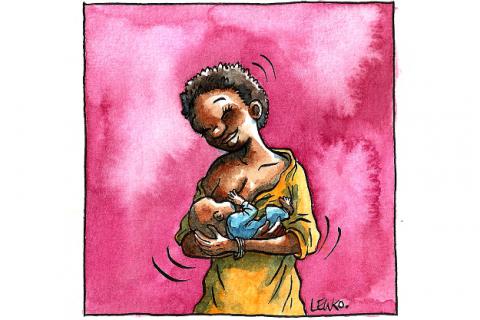
here is a brilliant list of all the things you need to know about breastfeeding and how truly essential its role is in guaranteeing children’s healthy development.
Babies who are breastfed are generally healthier and achieve optimal growth and development compared to those who are fed formula milk.
If the vast majority of babies were exclusively fed breastmilk during the first six months of their life – that is, only breastmilk and no other liquids or solids, not even water – it is estimated that at least 1.2 million children’s lives would be saved every year.
If children continue to be breastfed up to two years and beyond, the health and development of millions of children would be greatly improved.
Infants who are not breastfed are at an increased risk of illness that can compromise their growth and raise the risk of death or disability.
Breastfeeding is the natural and recommended way of feeding all infants, even when artificial feeding is affordable, clean water is available, and good hygienic conditions for preparing and feeding infant formula exist.
What every family and community should know about breastfeeding
1. Breastmilk alone is the best food and drink for an infant for the first 6 months of its life. No other food or drink, not even water, is usually needed during this period.
2. Newborn babies should be given to the mother to hold immediately after delivery. They should have skin-to-skin contact with the mother and begin breastfeeding within one hour of being born.
3. Almost every mother can breastfeed successfully. Breastfeeding the baby frequently results in the production of more milk. The baby should breastfeed at least eight times a day, day and night, and on demand.
4. Breastfeeding helps protect babies and young children against dangerous illnesses. It also creates a special bond between mothers and their child.
5. Bottle feeding and giving a baby breastmilk substitutes such as infant formula or animal milk can threaten the baby’s health and survival.If a woman cannot breastfeed her infant, the baby can be fed expressed breastmilk or, if necessary, a quality breastmilk substitute from an ordinary clean cup.
6. If a woman is infected with HIV, there is a risk of her passing the infection on to her infant through breastfeeding. In the first six months, this risk is much greater if the infant is fed both breastmilk and other liquids and foods than if fed breastmilk alone. Therefore, it is recommended that the baby receives only breastmilk for the first six months, unless it is acceptable, feasible, affordable, sustainable and safe to exclusively give breastmilk substitutes (infant formula).
7. A woman with a job away from her home can continue to breastfeed her child. She should breastfeed as often as possible when she is with the infant and express her breastmilk when they are apart so that another caregiver can feed it to the baby in a hygienic and safe way.
8. After 6 months of age, when babies begin to eat foods, breastfeeding should continue for up to two years and beyond because it is an important source of nutrition, energy and protection from illness.
Source: Pona Bana
 FR
FR EN
EN AR
AR








